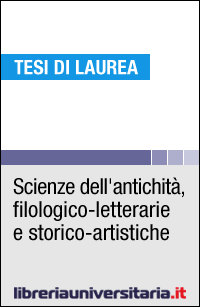
Los Angeles Chicana: Alejandro Morales, Oscar Zeta Acosta, Ron Arias in context
- Tipologia:
Tesi di Laurea di secondo livello / magistrale
- Anno accademico:
2001/2002
- Coautore:
- Elena Corelli Grappadelli
- Relatore:
- Daniela Ciani Forza
- Correlatore:
- Flavio Fiorani
- Facoltà:
Lingue e Letterature Straniere
- Corso:
Lingue e letterature moderne euroamericane
- Cattedra:
Lingue e letterature anglo-americane
- Lingua:
- Inglese
- Pagine:
- 178
- Formato:
- Protezione:
- DRM Adobe
- Dimensione:
- 2.73 Mb
Descrizione Los Angeles Chicana: Alejandro Morales, Oscar Zeta Acosta, Ron Arias in context
In the last twenty-five years Chicano literature has enjoyed a growing consideration and popularity both by criticism and general readership, which can be due to the sensibility and attention that a renewed cultural climate and the globalization of mass media have brought towards “de-centered” forms of culture. The Chicano case, in particular, distinguishes itself from most of the other so-called ‘ethnic minorities’, because of the fact that these people’s ancestors were not slaves imported from other continents or immigrants; on the contrary, they were the result of the racial mixing between the native American population and the Spanish conquerors and they have always inhabited the territories in which they still live today. The three novels that I am going to analyze were written in the first half of the 1970s, in a crucial moment of transition from the initial “boom” of the first forms of Chicano literature, closely connected to a precise ideal of Chicano identity with strong political and ethnic implications, to the extremely variegated literary experiences of today, when Chicano literary production can be rightfully numbered among world literature. The choice of these novels comes from my intention of putting into evidence the very different approaches of their authors to the central theme of the search for identity, which has always characterized the Chicano people and which violently erupted into the political action of the Chicano Movement between 1965 and 1975, on the footsteps of the general Civil Right Movement that was revolutionizing the U.S. society. The first chapter of my dissertation, therefore, is aimed at offering a necessary overview on Mexican-North-Americans’ history, retracing its origin in the first encounter of the American native inhabitants with the European “Other.” The purpose of the following pages is to account for those historical events that have determined the birth of the Chicano reality and still have a fundamental influence in the complex process of redefinition of the Chicano identity. The paragraph on the Chicano Movement is intended to show its important mission in terms of individual and group awareness of a common identity, but also the heterogeneity and the faults of a political movement that wanted to put together different and often irreconcilable social souls. The variety of perspectives on Chicano urban reality is reflected in the three novels that I analyze in the second part of these essay. Alejandro Morales’s Caras viejas y vino nuevo is settled in a degenerated barrio and projects a disturbing vision on the life of the Chicano community, which contradicts the picturesque and idealistic depiction that emerged from the literary production of the previous generation. The events of Oscar Zeta Acosta’s The Revolt of the Cockroach People take place in Los Angeles during the turbulent years of the Chicano Movement activity, and the way they are narrates puts into question the identity of the Self with regards to the superior political common cause. With Ron Arias’s The Road to Tamazunchale the Chicano novel overcomes any kind of social realism or political commitment and, through narrative devices that look at Latin American Realismo Mágico, it is definitively raised to the range of world literature. The order that I have chosen to introduce the novels does not intend to collocate these authors in an evolutionary progression in terms of their literary production, but to represent the ideal opening of the spaces and perspectives of Chicano narrative from the local context to a universal dimension. The very different approaches with which each author faces the multifaceted theme of the search for identity mirrors the ambiguity of labeling their production under the term of ‘ethnicity’, as its very definition is based on an ever-changing dialectics between the individual subjectivity and the social environment, between past and present. In my final chapter I will argue how these aspect emerges, maybe unconsciously, from the three novels: it does not go only beyond the assimilation model, but also beyond the multicultural social project, and it has begun to be questioned only by recent ‘post-ethnic’ criticism.


